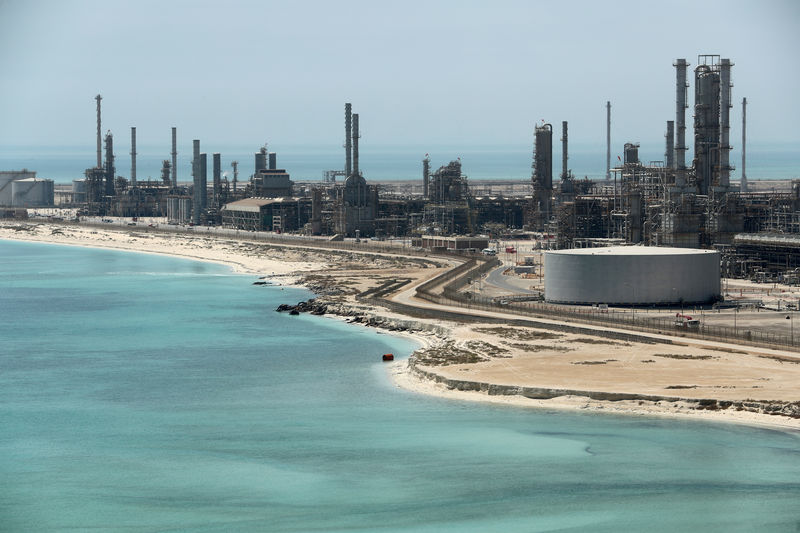 © Reuters. FILE PHOTO: General view of Saudi Aramco’s Ras Tanura oil refinery and oil terminal in Saudi Arabia
© Reuters. FILE PHOTO: General view of Saudi Aramco’s Ras Tanura oil refinery and oil terminal in Saudi ArabiaBy Rania El Gamal
DHAHRAN, Saudi Arabia (Reuters) – Saudi Arabia raised oil production to an all-time high in November, an industry source said on Monday, as U.S. President Donald Trump piled pressure on the kingdom to refrain from production cuts at an OPEC meeting next week.
The industry source, who is familiar with the matter, said Saudi production hit 11.1-11.3 million barrels per day (bpd) in November, although it will not be clear what the exact average November output is until the month is over.
Those levels are up around 0.5 million bpd – equal to 0.5 percent of global demand – from October and more than 1 million bpd higher than in early 2018, when Riyadh was curtailing production together with other OPEC members.
Saudi Arabia agreed to raise supply steeply in June, in response to calls from consumers, including the United States and India, to help cool oil prices and address a supply shortage after Washington imposed sanctions on Iran.
But the move backfired on Riyadh after Washington imposed softer than expected sanctions on Tehran. That triggered worries of a supply glut and prices collapsed to below $60 per barrel on Friday from as high as $85 per barrel in October.
Saudi oil industry sources have signaled they wanted prices to stay above $70 per barrel and Saudi energy minister Khalid al Falih said this month global oil supply could exceed demand by over 1 million bpd next year, requiring OPEC to take action.
OPEC will consider a deal to lower production when it meets next week, but Trump again called on Saudi Arabia to refrain from cuts.
On Sunday, Trump thanked himself for lower oil prices and compared it to a big tax cut for the U.S. economy.
“So great that oil prices are falling (thank you President T),” Trump tweeted, referring to himself.
Last week, Trump tweeted: “Oil prices are getting lower… Thank you Saudi Arabia but let’s go lower”.
Falih said earlier this month that state oil giant Saudi Aramco would ship 0.5 million bpd less crude in December than in November as demand from customers was lower.
Possibly complicating Saudi decisions on oil output is the crisis around the killing of journalist Jamal Khashoggi at Riyadh’s consulate in Istanbul last month.
Trump stood behind Saudi Crown Prince Mohammed bin Salman despite calls from many U.S. politicians to impose stiff sanctions on Riyadh. Prince Mohammed is the ultimate Saudi oil policy maker and Saudi watchers have said the Prince will try to avoid confrontation with Washington, including on the oil price front.
Fusion Media or anyone involved with Fusion Media will not accept any liability for loss or damage as a result of reliance on the information including data, quotes, charts and buy/sell signals contained within this website. Please be fully informed regarding the risks and costs associated with trading the financial markets, it is one of the riskiest investment forms possible.
Source: Investing.com



























